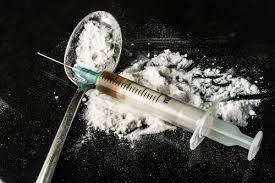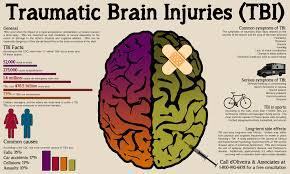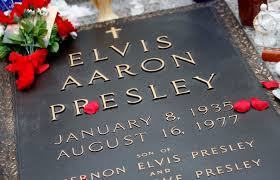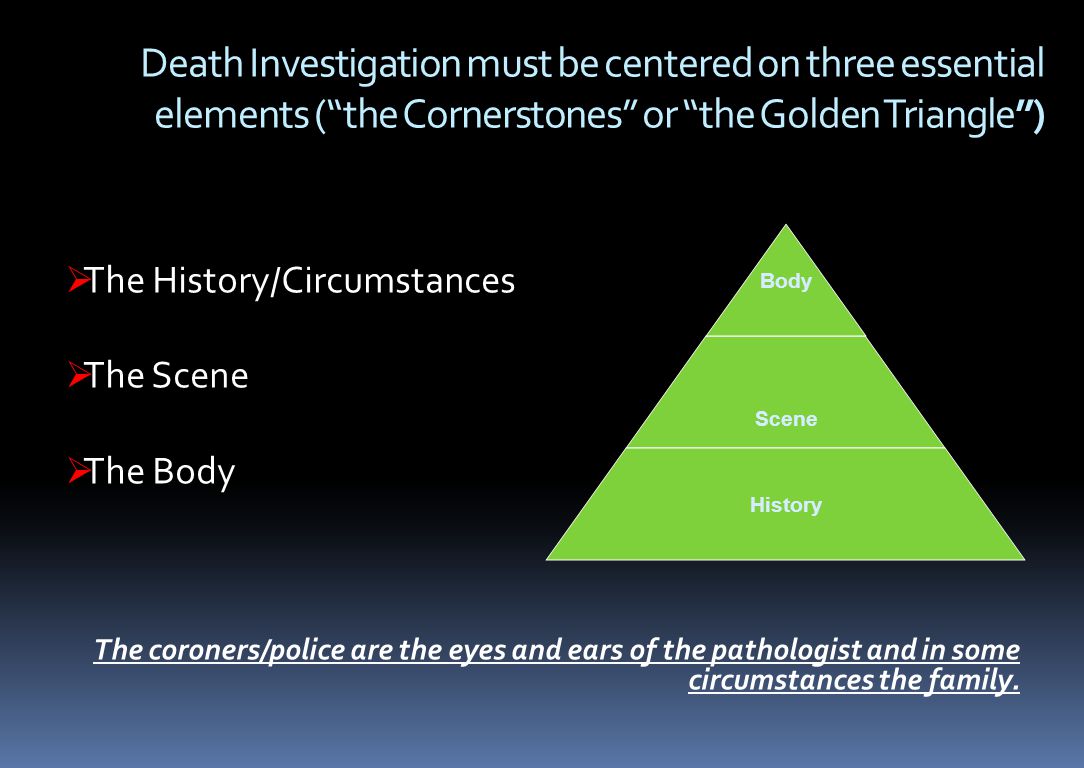 Elvis Presley suddenly dropped in the bathroom of his Graceland mansion on the afternoon of August 16, 1977. Elvis was rushed to Baptist Memorial Hospital in Memphis, Tennessee, where he was pronounced dead, then shipped to the morgue and autopsied the same afternoon. Three days later, the Memphis County coroner issued Elvis Presley’s death certificate stating the cause as hypertensive cardiovascular disease with atherosclerotic heart disease — a heart attack subsequent to high blood pressure and blocked coronary arteries.
Elvis Presley suddenly dropped in the bathroom of his Graceland mansion on the afternoon of August 16, 1977. Elvis was rushed to Baptist Memorial Hospital in Memphis, Tennessee, where he was pronounced dead, then shipped to the morgue and autopsied the same afternoon. Three days later, the Memphis County coroner issued Elvis Presley’s death certificate stating the cause as hypertensive cardiovascular disease with atherosclerotic heart disease — a heart attack subsequent to high blood pressure and blocked coronary arteries.
It was a rush to judgment. Toxicology results soon identified ten pharmaceutical drugs in Elvis’s system. Codeine was ten times the therapeutic level and the combination of other prescription drugs suggested a poly-pharmacy overdose. This revelation started immediate accusations of a cover-up and conspiracy theories quickly hinted at sinister criminal acts.
Four decades later, modern medicine and forensic science looked at the Presley case facts. The review indicated something entirely different from a heart attack or drug overdose really killed the King of Rock ‘n Roll. It said Elvis Presley accidentally died after long-term complications from earlier traumatic brain injuries (TBIs). TBIs are known as silent, stalking, and patient killers.
Looking back, it’s likely old accidental head injuries triggered events leading to Elvis Presley’s death.
From my experience investigating unexpected and unexplained sudden deaths, the accidental conclusion makes sense when you consider the totality of evidence in Elvis’s death. Setting aside media reports of gross negligence, arm-chair speculation of cover-up, and fan accusations that the King was murdered, there’s a simple and straightforward conclusion based on facts. But before examining the facts and knowing hindsight is 20/20, let’s first look at how coroners conduct sudden and unexplained death investigations.
Coroners are the judge of death. Their responsibility is establishing five main facts surrounding a death. Coroners are not to assign blame or fault. In the Presley case, the five facts determined at the immediate time were:
-
Identity of Deceased — Elvis Aaron Presley
-
Time of Death — Approximately 2:00 p.m. on Tuesday, August 16, 1977
-
Place of Death — 3754 Elvis Presley Boulevard, Memphis, Tennessee
-
Cause of Death — Heart attack
-
Means of Death — Chronic heart disease
 There’s a distinct difference between Cause of Death and Means of Death. Cause is the actual event. Means is the method in which death happened. Examples are cause being a ruptured aorta with means being a motor vehicle crash, or cause being massive cerebral interruption with means being a gunshot wound to the head.
There’s a distinct difference between Cause of Death and Means of Death. Cause is the actual event. Means is the method in which death happened. Examples are cause being a ruptured aorta with means being a motor vehicle crash, or cause being massive cerebral interruption with means being a gunshot wound to the head.
Once the facts are known, it’s the coroner’s duty to classify the Manner of Death. There are five universal manner of death classifications:
-
Natural
-
Homicide
-
Suicide
-
Accidental
-
Undetermined
Elvis Presley’s death was ruled a natural event, thought at the time being an acute cardiac event from existing cardiovascular disease. If the coroner determined Elvis died from a drug overdose, the ruling would have been accidental. No one ever claimed it was suicide or homicide.
One principle of death investigation is to look for antecedent evidence—preexisting conditions which contributed to the death mechanism or was responsible for causing or continuing a chain of events that led to the death.
Another principle of death investigation is examining the cornerstone triangle of Scene—Body—History. This compiles the totality of evidence or case facts. Given that, let’s look at the evidence and case facts in Elvis Presley’s death.
Scene
Elvis was found on his bathroom floor, face down in front of the toilet. It was apparent he’d instantly collapsed from a sitting position and there was no sign of a distress struggle or attempt to summon help. When the paramedics arrived, Elvis was cold, blue and had no vital signs. Rigor mortis had not set in so he’d probably expired within the hour. He was transported by ambulance to Baptist Memorial Hospital where a vain attempt at resuscitation occurred because “he was Elvis”.
 ER doctors declared Elvis dead at 3:16 p.m. He was moved to the morgue where an autopsy was promptly performed. There was no suggestion of suicide or foul play so there was no police investigation. The scene wasn’t photographed, nor preserved, and there was no accounting for what medications or other drugs might have been present at Graceland. There’s no official record of the coroner attending the scene as this was considered an in-hospital death and a routine occurrence.
ER doctors declared Elvis dead at 3:16 p.m. He was moved to the morgue where an autopsy was promptly performed. There was no suggestion of suicide or foul play so there was no police investigation. The scene wasn’t photographed, nor preserved, and there was no accounting for what medications or other drugs might have been present at Graceland. There’s no official record of the coroner attending the scene as this was considered an in-hospital death and a routine occurrence.
Body
Elvis was in terrible health. His weight was estimated at 350 pounds—gaining 50 lbs. in the last few months of his life. He was virtually non-functional at the end, being mostly bed-ridden and requiring permanent nursing care. Elvis suffered from an enlarged heart which was twice the size of normal and showed advanced evidence of cardiovascular disease in his coronary vessels, aorta, and cerebral arteries—certainly more advanced than a normal 42-year-old would be. His lungs showed signs of emphysema, although he’d never smoked, and his bowel was found to be twice the length of normal with a partially-impacted stool estimated to be four months old.
Elvis also suffered from hypogammaglobulinemia which is an immune disorder, as well as showed evidence of an autoimmune inflammatory disorder.
Toxicology tested positive for ten separate prescription medications but showed negative for illicit drugs and alcohol. The only alarming pharmaceutical indicator, on its own, was codeine at ten times the prescribed manner but not in lethal range.
History
Elvis was born on January 8, 1935 in Tupelo, Mississippi and had a twin brother who died at birth. As a youth, Elvis was active and healthy which continued during his time in the U.S. military and all through his early performing stage when he was a bundle of energy. He began experimenting with amphetamines, probably to enhance his performances, but shied from alcohol as it gave him violent tendencies.
 In 1967, Elvis came under the primary care of Dr. George Nichopoulos who was well-known to celebrities. Then, Elvis was 32 and weighed 163 pounds. His only known medical ailment was slightly high blood pressure, presumably due to his high-fat diet.
In 1967, Elvis came under the primary care of Dr. George Nichopoulos who was well-known to celebrities. Then, Elvis was 32 and weighed 163 pounds. His only known medical ailment was slightly high blood pressure, presumably due to his high-fat diet.
Also in 1967, Elvis’s health took a sudden turn with progressive pain, insomnia, hypertension, lethargy, irrational behavior and immense weight gain. Over his remaining years, Elvis was seen by a number of different doctors and was hospitalized a number of times, all the while resorting to self-medication with a wide assortment of drugs from dozens of sources.
Doctor Nick, as Nichopoulos was called, stayed as Elvis’s personal physician till the end. He was present at the death scene as well as during the autopsy. Doctor Nick concurred with the coroner’s immediate conclusion that the cause of death was a natural cardiac event resulting from an arrhythmia, or sudden interruption of heartbeat, and agreed that Elvis’s death was not due to a drug overdose.
When the toxicology report was released, it came with a qualifier:
Because the tox report appeared to contradict the autopsy report’s stated cardiac cause of death, a prominent toxicologist was asked to review the findings. His opinion was:
“Coupled with this toxicological data are the pathological findings and the reported history that the deceased had been mobile and functional within 8 hours prior to death. Together, all this information points to a conclusion that, whatever tolerance the deceased may have acquired to the many drugs found in his system, the strong probability is that these drugs were the major contribution to his demise.”
The Tennessee Board of Health then investigated Elvis’s death which resulted in proceedings against Doctor Nick.
 Evidence showed that during the seven and a half months preceding Elvis’s death—from January 1, 1977, to August 16, 1977—Doctor Nick wrote prescriptions for Elvis for at least 8,805 pills, tablets, vials, and injectables. Going back to January 1975, the count was 19,012.
Evidence showed that during the seven and a half months preceding Elvis’s death—from January 1, 1977, to August 16, 1977—Doctor Nick wrote prescriptions for Elvis for at least 8,805 pills, tablets, vials, and injectables. Going back to January 1975, the count was 19,012.
These numbers might defy belief, but they came from an experienced team of investigators who visited 153 pharmacies and spent 1,090 hours going through 6,570,175 prescriptions and then, with the aid of two secretaries, spent another 1,120 hours organizing the evidence.
The drugs included uppers, downers and powerful painkillers such as Dilaudid, Quaalude, Percodan, Demerol, and Cocaine Hydrochloride in quantities more appropriate for those terminally ill with cancer.
 Doctor Nick admitted to this. His defense was because Elvis was so wired on pain killers, he prescribed these medications to keep Elvis away from dangerous street drugs, thereby controlling Elvis’s addiction—addiction being a disease.
Doctor Nick admitted to this. His defense was because Elvis was so wired on pain killers, he prescribed these medications to keep Elvis away from dangerous street drugs, thereby controlling Elvis’s addiction—addiction being a disease.
One of the defense witnesses was Dr. Forest Torrent, a prominent California physician and a pioneer in the use of opiates in pain treatment who explained how the effects this level of codeine would have contributed to Elvis’s death.
Central to misconduct allegations was the issue of high codeine levels in Elvis at the time of death—codeine being the prime toxicological suspect as the pharmaceutical contributor. It was established that Elvis obtained codeine pills from a dentist the day before his death and Doctor Nick had no knowledge of it.
The jury bought it, and Doctor Nick was absolved of negligence in directly causing Elvis Presley’s fatal event.
Continuing Investigation
 Dr. Torrent was convinced there were other contributing factors leading to Elvis’s death. In preparation for Doctor Nick’s trial, Dr. Torrent had access to all of Elvis Presley’s medical records, including the autopsy and toxicology reports. Incidentally, these two reports are the property of the Presley estate and are sealed from public view until 2027, fifty years after Elvis’s death.
Dr. Torrent was convinced there were other contributing factors leading to Elvis’s death. In preparation for Doctor Nick’s trial, Dr. Torrent had access to all of Elvis Presley’s medical records, including the autopsy and toxicology reports. Incidentally, these two reports are the property of the Presley estate and are sealed from public view until 2027, fifty years after Elvis’s death.
Dr. Torrent was intrigued by the sudden change in Elvis starting in 1967. He discovered that while in Los Angeles filming the movie Clambake, Elvis tripped over an electrical cord, fell, and cracked his head on the edge of a porcelain bathtub. Elvis was knocked unconscious and had to be hospitalized. Dr. Torrent found three other incidents where Elvis suffered head blows, and he suspected Elvis suffered from what’s now known as Traumatic Brain Injury—TBI—and that’s what caused progressive ailments leading to his death.
Dr. Torrent released a paper titled Elvis Presley: Head Trauma, Autoimmunity, Pain, and Early Death. It’s a fascinating read—recently published in the credible medical journal Practical Pain Management.
 Dr. Torrent builds a theory that Elvis’s bathtub head injury was so severe it jarred brain tissue loose which leaked into his overall blood circulation. Later additional head injuries exacerbated the problem. This is now known to be a leading cause of autoimmune disorder which causes a breakdown of other organs. This progression was unknown in 1967 and Elvis went untreated. Side effects of TBIs include chronic pain, irrational behavior, and severe bodily changes such as obesity and enlarged organs like hearts and bowels.
Dr. Torrent builds a theory that Elvis’s bathtub head injury was so severe it jarred brain tissue loose which leaked into his overall blood circulation. Later additional head injuries exacerbated the problem. This is now known to be a leading cause of autoimmune disorder which causes a breakdown of other organs. This progression was unknown in 1967 and Elvis went untreated. Side effects of TBIs include chronic pain, irrational behavior, and severe bodily changes such as obesity and enlarged organs like hearts and bowels.
Today, TBI is a recognized health issue in professional contact sports as well as incidental to motor vehicle accidents and workplace falls or other head injury events.
 Dr. Torrent’s hypothesis holds that with a change in mental state and suffering chronic pain, Elvis Presley entered a ten year spiral towards death. He became hopelessly addicted to pain killers, practiced a terribly unhealthy diet and lethargic lifestyle, and resorted to the typical addict’s habit of sneaking a fix wherever he could. This led to early coronary vascular disease and, combined with his escalating weight and pill consumption, Elvis was a heart attack ready to burst.
Dr. Torrent’s hypothesis holds that with a change in mental state and suffering chronic pain, Elvis Presley entered a ten year spiral towards death. He became hopelessly addicted to pain killers, practiced a terribly unhealthy diet and lethargic lifestyle, and resorted to the typical addict’s habit of sneaking a fix wherever he could. This led to early coronary vascular disease and, combined with his escalating weight and pill consumption, Elvis was a heart attack ready to burst.
Recall that I used the term antecedent, like all coroners do when assessing a cause of death. Given Dr. Torrent’s observations—and all the facts compiled from forty years—if I were the coroner completing Elvis Presley’s death certificate today, I’d write it like this:
-
Identity of Deceased — Elvis Aaron Presley.
-
Time of Death — Approximately 2:00 p.m. on Tuesday, August 16th, 1977.
-
Place of Death — 3754 Elvis Presley Boulevard, Memphis, Tennessee.
-
Cause of Death — Cardiac arrhythmia/myocardial infarction, antecedent to hypertensive cardiovascular disease with atherosclerotic heart disease, antecedent to poly-pharmacy, antecedent to autoimmune inflammatory disorder, antecedent to traumatic brain injury/injuries.
-
Means of Death — Cumulative head trauma.
Therefore, I’d have to classify Elvis’s death as an accident.
 There’s no one to blame—certainly not Elvis. He was a severely injured and sick man. There’s no specific negligence on anyone’s part and definitely no cover-up or conspiracy of a criminal act.
There’s no one to blame—certainly not Elvis. He was a severely injured and sick man. There’s no specific negligence on anyone’s part and definitely no cover-up or conspiracy of a criminal act.
If Dr. Forrest Torrent is right, there simply wasn’t a proper understanding back then to clearly determine what really killed the King of Rock ‘n Roll.
* * *
Here’s the link to Dr. Torrent’s article Elvis Presley: Head Trauma, Autoimmunity, Pain, and Early Death as published in Practical Pain Management.
https://www.practicalpainmanagement.com/sites/default/files/images/2013/06/19/1.jpg
Fun Stuff With Elvis & John Fogerty




I only just now discovered your article & here it is ~ a whole year later! Such interesting facts & research has been done on TBIs & it’s the first I’ve read on it. When my father was merely a lad ~ he was chased down by a colt in the barnyard & stomped on his forehead. The old country vet sewed him up & that was that. Dad was a man who took very good care of himself & was hardly ever ill. About 10 years after he retired, he began to have horrible headaches. A cancerous brain tumor was removed but he passed about 6 weeks after surgery. Your articles got me wondering about his condition & the possibility of TBI. Thank you for sharing your wisdom & introducing your topics of great interest.
Thank you so much for visiting my site and taking the time to comment, Eileen. I always appreciate feedback – good or bad 🙂 I think medical science is only starting to understand the long-term effects of TBIs. Much of that pressure has come from professional sports figures. Sorry about your dad suffering at the end. I wouldn’t be a bit surprised if his malady was a complication from a much earlier TBI.
Heartbreaking story. Hey, there’s a series on Prime called Autopsy that you’d really enjoy, Garry. Each episode focuses on a different celebrity. We just finished Robin Williams’ autopsy story. Gut-wrenching. Check it out.
Heartbreaking is right, Sue. Such a talent loss. Autopsy – haven’t heard of it – I gotta get Prime so I can check it out 🙂 Was there anything in Robin Williams’ brain section that indicated his level of genius and the malady that caused his depression? Also, anything on JFK’s autopsy in the series yet?
Robin Williams didn’t commit suicide because of his depression. The media got that wrong (surprise, surprise). He had Parkinson’s Disease for years, which he kept hidden. Not only that, but he had a secondary disease that literally tunneled through his brain, causing severe paranoia, hallucinations, tremors, imbalance, voices, etc. Suicide is a common practice for these patients, because they feel it’s their only escape. This disease literally drives them to take their own life. Dang. I wish I could remember the name of it. The poor guy never stood a chance.
Hmm, not sure about JFK. There’s several seasons. Marilyn is in there, though.
Well, I did not know that. I made the assumption he had some form of clinical depression. I had no idea he was suffering from Parkinson’s and I’m really curious about what else was medically amiss. There might be a blog post in this. Thanks for enlightening me, Sue!
Sue,
I know a woman with PD, and she’s told me that without her meds, she hallucinates. One was a regular visit of a squirrel wearing a sweater… Funny to think about, but scary as h3ll for her. Fortunately, there have been great strides with Irish scientists this year for a PD breakthrough cure. Michael J Fox is now investing in this research.
Also something to consider is that many comedians suffer from depression, some of them very serious depression. Comedy is a form of mania. The funnier they are, the more they can be suffering. Some of the older comedians from Williams’ early days self-medicated with drugs and alcohol. He started off around the same time as John Belushi, Andy Kaufman, Chris Farley…all drugs overlaid on top of depression. Steve Martin and Eddie Murphy are still with us because they saw what drugs were doing to their friends and sought help.
It’s not just comedians though. Check the 27 Club…
Agreed, Kem, but Robin Williams had his depression under control. It’s the brain disease that drove him to end his life. Still can’t remember the name of the disease. You have Prime, though, right? Check out Autopsy. Fascinating show. Speaking of self-medicating, we also watched episodes on Anna Nicole Smith, Michael Jackson, and Whitney Houston, who took self-medicating to a whole new level.
Thanks, Sue. We do have Prime. I’ll check out the program. I think older shows are on regular TV now. It sounds familiar. I watch several reality crime shows like this and other investigative shows. All very interesting.
Robin Williams, had, in additoin to Parkinson’s, Lewey Body Dementia. Terrible disease. As a psych nurse, I cared for a few folks who had it.
Lewy body syndrome. That was diagnosed after Robin died. Only way it can be definitely diagnosed is by autopsy.
Also, about Elvis. I read a while ago, cannot find the reference now, about a woman who was tracing Elvis’ ancestry. She found that few of his ancestors lived past 50, and most were younger. She also noticed that they suffered from heart issues, severe overweight issues, pain, and other organ problems. She traced it to an immune disease and she felt that, judging by Elvis’ behavior and pain issues, that he also suffered from the same disease. Wish I could locate that article. I saved it “somewhere”. Of course, I cannot find it now.
If anyone else saw it, please post it.
Oh. I didn’t mention above that it came from Elvis’ mother’s side of the family.
A very interesting post. I had no idea that such things could result from TBI. Considering there are few of us who haven’t been hit on the head accidentally or otherwise, kids falling out of trees, auto accidents, etc, you would have to expect a lot of odd body symptoms such as auto immune disorder. Indeed, the incidence seems to be rising.
I suspect long-term TBI complications have been there all along but the medical community hasn’t associated the autoimmune symptoms until recently – since more TBI studies have been done. Possibly early intervention and symptom management in Elvis’s case may have prolonged his life. Unfortunately, hindsight is near-perfect. Thanks for commenting, Virginia.
Wow! Incredible stuff. I remember the day Elvis died and couldn’t believe it. All of this ‘new’ evidence gives a whole new understanding of what happened. And compounds the influence people with money have over medical ‘professionals.’ ie Prince and Michael Jackson who both had prescription drug addictions that their personal physicians supplied. How many more are out there? I wonder. Great article!
What likely happened to Elvis is an eye-opener to say the least. I also remember where I was and what I was doing when I heard that Elvis died – it’s one of the events of the time you just don’t forget. It does make you wonder how many more high-profile people have life-threatening addiction issues. Thanks for commenting, KA.
Right. Where were you when XX died…Kennedy, Elvis, Michael Jackson, Prince…
And yes! How many others are suffering from underlying conditions? And perhaps, how many ME’s release vague causes of death so as not to humiliate the celebrity or embarrass their families? Heart attack for Elvis is much more acceptable than him being a druggie. But sadly, drugs seem to be the underlying condition to most celebrity deaths these days. This is why there’s such a thing as the 27 Club…
Right, the 27 Club. Immediately the names Cobain, Joplin, Jones, Hendrix, Morrison and Winehouse come to mind. Superbly talented but seriously troubled young artists. Sadly, I’m sure the club’s door remains open.
Yep, those are the most famous who died from drugs. Cobain’s death is still up for speculation though. Many believe he was murdered.
And yep, the door remains open as long as people continue to go undiagnosed and celebrity doctors are willing to keep writing prescriptions. Extremely sad! Family and friends need to stop worrying about upsetting someone they suspect of depression, or drug addiction. The whole ‘he/she has to want help, you can’t make them get it…’ is BS. Drug addicts only know they feel great and want to stay feeling great, so why stop using? There has to be something else for them before it’s too late.
What a sad story. Thanks for sharing these events with us.
It sure is a sad story, Michael. Such a talent – such a loss. I think Dr. Torrent makes a conclusive case that a series of TBIs were the root cause of Elvis’s demise. Sad, indeed 🙁